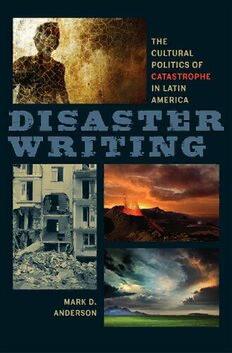
Disaster Writing: The Cultural Politics of Catastrophe in Latin America PDF
Preview Disaster Writing: The Cultural Politics of Catastrophe in Latin America
Disaster Writing New World Studies J. Michael Dash, Editor Frank Moya Pons and Sandra Pouchet Paquet, Associate Editors Disaster Writing The Cultural Politics of Catastrophe in Latin America Mark D. Anderson University of Virginia Press Charlottesville and London University of Virginia Press © 2011 by the Rector and Visitors of the University of Virginia All rights reserved Printed in the United States of America on acid-free paper First published 2011 9 8 7 6 5 4 3 2 1 Library of Congress Cataloging-in-Publication Data Anderson, Mark D., 1974– Disaster writing : the cultural politics of catastrophe in Latin America / Mark D. Anderson. p. cm. — (New world studies) Includes bibliographical references and index. ISBN 978-0-8139-3196-8 (cloth : acid-free paper) ISBN 978-0-8139-3197-5 (pbk. : acid-free paper) ISBN 978-0-8139-3203-3 (e-book) 1. Latin American literature—History and criticism. 2. Disasters in literature. 3. Catastrophes (Geology) in literature. 4. Literature and society—Latin America. 5. National characteristics in literature. I. Title. PQ7081.A566 2011 860.9'3556—dc22 2011015738 A book in the American Literatures Initiative (ALI), a collaborative publishing project of NYU Press, Fordham University Press, Rutgers University Press, Temple University Press, and the University of Virginia Press. The Initiative is supported by The Andrew W. Mellon Foundation. For more information, please visit www.americanliteratures.org. For Norma and Natalia, who preserve me from the posthuman Contents Acknowledgments ix Introduction: Approaching Disaster 1 1 Disaster and the “New Patria”: Cyclone San Zenón and Trujillo’s Rewriting of the Dominican Republic 29 2 Drought and the Literary Construction of Risk in Northeastern Brazil 56 3 Volcanic Identities: Explosive Nationalism and the Disastered Subject in Central American Literature 107 4 Fault Lines: Mexico’s 1985 Earthquake and the Politics of Narration 145 Conclusion: On Writing and the Nationalization of Catastrophe 191 Notes 197 Works Cited 219 Index 237 Acknowledgments I am sure that when Bill Megenney decided to include Graciliano Ramos’s Vidas secas and Rachel de Queiroz’s O quinze in a master’s course on Brazilian literature for Spanish speakers at the University of California, Riverside, he had few ulterior motives beyond finding texts relatively easy to read in Portuguese and his own love for the Nordeste. Neither he nor I could then imagine that, ten years later, the fascination with disaster narratives that those two texts elicited in me would give birth to this monstrous project spanning nations and literally thousands of texts relating to drought, flooding, hurricanes, earthquakes, landslides, sinkholes, and volcanic eruptions. Thanks, Bill. I am deeply grateful to the many friends and colleagues who have sup- ported me during the torturous intellectual wanderings through texts and continents that led me, against even my own expectations, to con- ceive and bring to fruition this book. I appreciate particularly the time and acuity that Ignacio López-Calvo, Susan Quinlan, Betina Kaplan, and the editors and anonymous readers at the University of Virginia Press and the American Literatures Initiative dedicated to my manu- script, as well as all the others whose conversation influenced my think- ing on the topic in a more indirect but no less influential way. I also wish to thank those authors and researchers whose work I cite, for their ex- plorations of disaster opened an entirely unsuspected world of inquiry to my eyes. I am deeply indebted to the Kluge Center at the Library of Congress and its staff for their support, especially Carolyn Brown and Mary Lou Reker, but also to the other Kluge fellows and all the people who brought the ridiculous number of books I ordered to my cubicle. I appreciate deeply the research funding and other support provided for this project by the administration and my colleagues at the University of North Texas and the University of Georgia.
